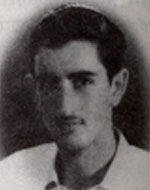Shmuel, son of Elsa (Elisheva) and Martin (Michael-Yehuda), was born on September 25, 1952, in London, England, and immigrated to Israel with his family when he was five months old. Aviv, after graduating from high school at the Rabbi Amiel Yeshiva in Tel Aviv, he was very fond of reading, and since he was fluent in the English language, he read many of the great works of England such as Shakespeare and Shaw. In his home, Shmuel grew up in an atmosphere of love of the land and Torah study, since his parents tried to act In the spirit of the verse, “worship the Lord with joy,” he also acquired the love of the Jewish people and his Torah, where the children were trained from a young age to serve Gd, and was closely associated with that youth group, After completing his elementary studies, he went to study at the yeshiva, where he studied in the Gemara and Mussar, and during his vacation he studied sand studies, reading and tours. Debban. ” Already in the early days of the yeshiva he took upon himself public positions that others were reluctant to deal with because of the great harassment involved. He was involved in the publication of the monthly booklet Lechtecha Be’ir Derech, and invested great efforts in order to win the soldiers’ words of Torah. He did not make do with yeshiva studies, but also dealt with general matters and matters of yeshiva in various fields. One of the tenets of his life was the realization of the harmony between the commandments between man and God, and the mitzvot between man and his fellow. He visited relatives and friends during days of joy and sick days or mourning, and mainly helped a lot of new members who came to the yeshiva. He always treated every person, especially his family. No one has ever grieved or insulted anyone. When it seemed to him that he had done wrong to someone, he did not rest until he had appeased him. He invested heavily in a constant examination of his actions, in order to improve them, and his behavior was exemplary, both because of his natural qualities and as a result of his constant self-criticism. Shmuel devoted his attention to studies, and the longer he became, the deeper he became. He studied at the yeshiva without the stimulating factor of examinations, grades and diplomas – but out of love and devotion, until the wee hours of the night. Every hour of regular school time, he sat in the library and studied for his pleasure. He loved to sing and enjoyed the singing of Zemirot in the yeshiva. On Saturdays he taught the family members songs and songs he had studied there. Shmuel was drafted into the IDF in January 1972 as part of the Nahal Brigade and assigned to the Armored Corps. After completing basic training, he completed a tank course for “Centurion”, and his military position was determined by a tank connection. He never complained about difficulties in the army’s life. On the contrary – he was Simcha with his actions and pleased his parents. During the army training period, he did his best not to change his normal way of life. He learned and read at every opportunity, and took every opportunity to talk with his non-religious friends to bring them closer to faith. These were impressed by his words, his devotion, and his complete faith. When the Yom Kippur War broke out, Shmuel accepted the burnt offering and its dangers with complete resignation, and with the understanding that what was required of him now was to fight, and therefore he acted loyally and without reservations, “out of complete faith.” During the battles that rained on the bridges in Sinai on October 19, 1973, Shmuel was hit by an artillery shell and killed. He was brought to eternal rest in the cemetery in Rishon Letzion. Survived by his parents and sister. After his fall, he was promoted to corporal. His parents, Together with the religious youth group, published a booklet in his memory, which included the words of teachers and friends about his character and the figure of his friend from the religious youth group, which also fell, including a collection of philosophical thoughts.
